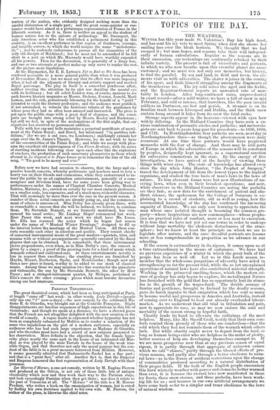TOPICS OF THE DAY.
THE WEATHER.
WINTER has this year made St. Valentine's Day his high feast, and has sent his icy veto to meet Spring when first she shows her smiling face over the bleak horizon. We thought that we had escaped it ; but man hopes, and seasons take their will independ- ently of human calculations. Regular as the seasons are in their succession, our reckonings are continually rebuked by their infinite variety. The present is full of vicissitudes and portents, j to which we Who now breathe upon this eventful planet are untie- ' customed ; and we must vex not only our memories, but history, to find the parallel. By sea and land, in field and town, the ele- ments visit us with adversities. The skater rejoices in the coming of his sport, and finds himself struggling among the fragments of the treacherous ice. The icy cold seizes the aged and the feeble, and the Registrar-General reports an unwonted rate of mor- tality in London. After long-continued rains, unprecedented in exact record—after a mild winter, we have a fall of snow in mid February, and cold so intense, that travellers, like the poor invalid soldiers on Dartmoor, are lost and perish. A. steamer is on its familiar track between Liverpool and Dublin, and the thick snow curtain hung around it hides from its crew the fatal rocks.
Strange aspects appear in the heavens—viewed with eyes how widely differing. In the Midland Counties they have seen a cu- rious combination of prismatic circles and parhelia ; and meteorolo- gists are sent back to years long past for precedents—to 1630, 1698, and 1721. In Huntingdonshire four parhelia are seen, next day in Northamptonshire three—as though the phaznomenon were daily recurrent. At one time these portents would have perplexed monarchs with the fear of change. And there may be still parts of Europe in which the adversities of the seasons will be construed by peoples, designedly kept ignorant, as a supernatural sanction for subversive commotions in the state. By the energy of free investigation, we have arrived at the faculty of viewing these things with wiser eyes. The state of knowledge has altered even since the day when John Hunter, "the Prophet of Surgery," traced the development of life from the lowest types to the highest organisms, and studied the true basis of man's laws in the laws of nature. To him aberrant forms were but new illustrations of un- erring laws, when seen in their broadest operations; and now, while observers in the Midland Counties are noting the parhelia ere they fade, as new data for the enrichment of patient and obe- dient science, the spokesman for the College of Surgeons is ex- plaining to a crowd of students, old as well as young, how the accumulated knowledge of the day has confirmed the far-seeing sagacity of Hunter. We are only now learning to appreciate the man whose once isolated thought is becoming the common pro- perty—whose inspirations are now commonplaces—whose prophe- cies are practical rules of conduct, more or less near to execution. It is true that we have not yet set our towns in order to undergo without large mortality the choleraic disturbances of the atmo- sphere; but we know at least the principle on which we are to legislate after nature, and the once dreadful portents are lessons more or less comprehensible in proportion as we advance in our schooling.
If the season is extraordinary in its rigour, it comes upon us at a time extraordinary in the means of endurance. We have had no previous experience of a winter in which the great bulk of the people has been so well off. Let us in this harsh season re- member that the wholesome purgations of adversity have aided in strengthening us for the present trial, while the as yet unexplained operations of natural laws have also contributed material strength. Working in the primaeval smelting-house, which the modern sci- ence of geology has only begun to explore, the metallurgist Nature has furnished with the gold that has so opportunely lent its stimu- lus to the growth of the wages-fund. The double scourge of famine and pestilence, brought to Ireland by the deadly seasons, gave its harsh impulse to that emigration which has sent so many to become useful and prosperous in America and Australia, instead of coming over to England to load our already overloaded labour- market. As we underwent that old trial in tribulation and pain, now to appreciate its uses, so may we now endure the cold and mortality of the season strong in hopeful faith.
Charity lends its hand to alleviate the sufferings of the most
helpless. Many, like Mr. Sheriff Croll, testify that their own com- forts remind them piously of those who are comfortless—that the cold which they feel not reminds them of the warmth which others lack. But while charity ought never to depart from the land, so long as human beings exist who are helpless in the midst of plenty, better sources of help are developing themselves amongst us. H we are more prosperous now than at any previous season of equal rigour, it is partly through that aggregate of unknown causes which we call "chance," partly through the blessed effects of pre- vious seasons, and partly also through a better obedience to natu- ral laws—as in the disuse of artificial restrictions upon the change of commodities produced according to a natural distribution of their proper fields. If the bulk of the English people encounters this hard winterly weather with purses and stomachs better warmed than ever, it is because the eternal laws now manifested in these icy frosts, these snow-storms, and these parhelia, have been work- ing life for us ; and because in our own artificial arrangements we have come back so far to a simpler and truer obedience to the laws of natural wisdom.


























 Previous page
Previous page